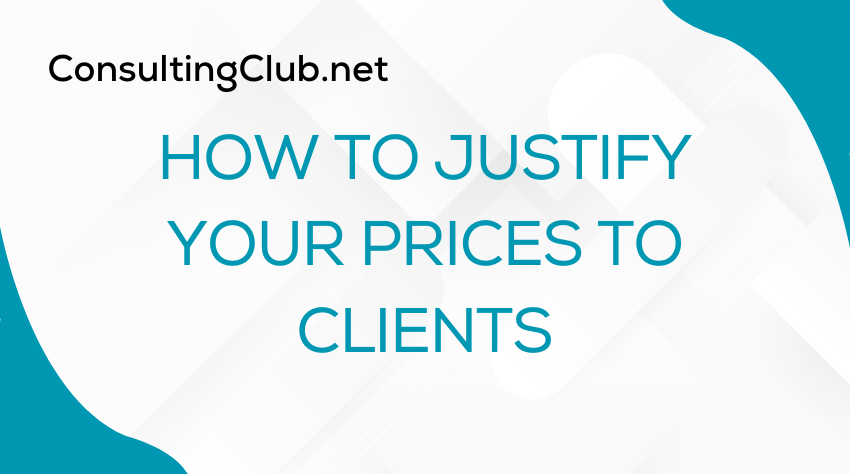Setting a fair price for your consulting services is only half the battle; the other half is explaining and justifying those prices to clients. Many consultants, especially new ones, feel uneasy discussing pricing, but with the right approach, you can confidently convey your value and gain clients’ trust. Here’s how to justify your consulting prices effectively and help clients see the value in investing in your expertise.
1. Highlight the Value and Outcomes
The best way to justify your rates is by focusing on the results and value you bring to your clients. Rather than simply explaining your services, connect your fees to the outcomes you’ll help them achieve.
For example:
• Translate your service into results: Rather than saying, “I’ll improve your marketing strategy,” explain how you’ll “increase customer engagement by 30% in the first quarter.”
• Showcase potential returns: Describe the long-term benefits your client can expect. If your service will streamline their operations or reduce costs, emphasize these gains to demonstrate value beyond the upfront fee.
2. Share Relevant Experience and Success Stories
Clients feel more comfortable paying higher fees when they see evidence of your expertise. Share specific examples, testimonials, or case studies that show how you’ve helped past clients achieve similar goals.
Tips:
• Use case studies: Describe a past client’s problem, your solution, and the results achieved. Quantifiable outcomes, like revenue increase or cost savings, are particularly impactful.
• Leverage testimonials: Share reviews or quotes from previous clients that vouch for your professionalism, expertise, and impact. Hearing it from others reassures clients of the value you offer.
3. Break Down Your Pricing Structure
Transparency can go a long way in helping clients understand and accept your rates. Give a clear breakdown of what’s included in your service, so clients see how their investment will be utilized.
For instance:
• Explain each component: Outline specific parts of the project, such as research, strategy sessions, or deliverables, so clients can see how you’ll allocate time and resources.
• Demonstrate your process: Describe your approach to solving their problem, and highlight the expertise and time involved in each stage. Clients will understand that they’re paying for a thorough, personalized process.
4. Address Pricing Objections Upfront
Some clients might hesitate at the price, especially if they don’t fully understand the value of your services. Address potential objections in a positive, constructive way that keeps the conversation moving forward.
Common objections and responses:
• “Why is it so expensive?” Explain how your services differ from generic solutions, such as tailored strategies or industry-specific expertise, which deliver more value.
• “Can we lower the price?” Consider offering an alternative package with fewer services or shorter engagement to fit their budget. This keeps them engaged while illustrating the full value of your complete offering.
5. Show the Cost of Inaction
Help clients see that hiring you is an investment, not just an expense. Explain how delays or missed opportunities may cost them in the long run, making your service a worthwhile and strategic choice.
Example phrases:
• “Without a well-defined strategy, you may continue losing potential customers to competitors.”
• “An efficient solution now can prevent higher costs down the line and set a foundation for future growth.”
By framing your services as a way to prevent unnecessary expenses or missed opportunities, you help clients see that the cost of not investing could far exceed the initial fee.
6. Emphasize Your Unique Value Proposition
Explain what makes your consulting services different from competitors and why your experience, skills, or approach make you the best choice for their needs. Positioning yourself as a specialist who brings something unique to the table helps justify premium pricing.
Points to highlight:
• Specialization: If you have unique expertise in their industry, make it known. Specialized knowledge often justifies higher fees.
• Unique methodologies: If you have a proprietary approach or specialized tools, explain how these differentiate your services.
• Tailored solutions: Emphasize that your services are customized to each client, unlike cookie-cutter alternatives that may not yield the same impact.
7. Offer a Pilot or Introductory Service
If clients are hesitant about committing to your full rate, a smaller, initial project can help showcase your value without a big upfront investment. Once they see results, they’re more likely to commit to a larger engagement at your standard rate.
How to approach it:
• Offer a consultation session or initial assessment that previews the benefits of your full service.
• Design a mini project at a lower cost, focusing on one aspect of their needs that can yield a quick, tangible result.
• Once they see the impact, transition them to the full-service engagement, making it clear how you’ll build on the initial results for even greater outcomes.
8. Stand Firm on Your Value
Lastly, confidence is key. Clients are more likely to accept your rates if you communicate with clarity and conviction. If you’ve explained the value and they still push back, remember that your pricing reflects the quality and results you deliver. Standing by your rates demonstrates professionalism and reinforces that you’re confident in your expertise.
Reminders:
• Avoid underselling: Discounting your services can devalue them, making it harder to justify higher fees in the future.
• Be open to negotiation without compromising value: Consider offering different tiers or payment plans, but maintain your core pricing model as reflective of your expertise.
Final Thoughts
Effectively justifying your consulting prices involves a combination of clear communication, evidence of value, and confidence. By focusing on the benefits, outcomes, and unique expertise you bring, clients will recognize that your consulting fees are an investment in their success. With these strategies, you can confidently explain your rates, fostering stronger client relationships and building a consultancy that thrives on mutual respect and value.


